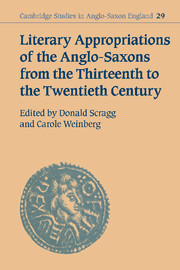Book contents
- Frontmatter
- Contents
- List of contributors
- Acknowledgements
- List of abbreviations
- Introduction. The Anglo-Saxons: fact and fiction
- 1 Victor and victim: a view of the Anglo-Saxon past in LaƷamon's Brut
- 2 Kings, constitution and crisis: ‘Robert of Gloucester’ and the Anglo-Saxon remedy
- 3 The South English Legendary: Anglo-Saxon saints and national identity
- 4 King Ælle and the conversion of the English: the development of a legend from Bede to Chaucer
- 5 Saxons versus Danes: the anonymous Edmund Ironside
- 6 New times and old stories: Middleton's Hengist
- 7 Crushing the convent and the dread Bastille: the Anglo-Saxons, revolution and gender in women's plays of the 1790s
- 8 Anglo-Saxon attitudes?: Alfred the Great and the Romantic national epic
- 9 ‘Utter indifference’?: the Anglo-Saxons in the nineteenth-century novel
- 10 The charge of the Saxon brigade: Tennyson's Battle of Brunanburh
- 11 Lady Godiva
- 12 The undeveloped image: Anglo-Saxon in popular consciousness from Turner to Tolkien
- Index of Anglo-Saxons mentioned in the text
- Index of authors and works cited
4 - King Ælle and the conversion of the English: the development of a legend from Bede to Chaucer
Published online by Cambridge University Press: 21 September 2009
- Frontmatter
- Contents
- List of contributors
- Acknowledgements
- List of abbreviations
- Introduction. The Anglo-Saxons: fact and fiction
- 1 Victor and victim: a view of the Anglo-Saxon past in LaƷamon's Brut
- 2 Kings, constitution and crisis: ‘Robert of Gloucester’ and the Anglo-Saxon remedy
- 3 The South English Legendary: Anglo-Saxon saints and national identity
- 4 King Ælle and the conversion of the English: the development of a legend from Bede to Chaucer
- 5 Saxons versus Danes: the anonymous Edmund Ironside
- 6 New times and old stories: Middleton's Hengist
- 7 Crushing the convent and the dread Bastille: the Anglo-Saxons, revolution and gender in women's plays of the 1790s
- 8 Anglo-Saxon attitudes?: Alfred the Great and the Romantic national epic
- 9 ‘Utter indifference’?: the Anglo-Saxons in the nineteenth-century novel
- 10 The charge of the Saxon brigade: Tennyson's Battle of Brunanburh
- 11 Lady Godiva
- 12 The undeveloped image: Anglo-Saxon in popular consciousness from Turner to Tolkien
- Index of Anglo-Saxons mentioned in the text
- Index of authors and works cited
Summary
Chaucer's Man of Law's Tale has not generally been discussed as a work embodying a view of Anglo-Saxon England and this aspect of the tale is admittedly not conspicuous. Nevertheless the tale is partly set in Anglo-Saxon England and has a central figure, Alla, who is an identifiable historical character, the sixth-century Anglo-Saxon king Ælle. Gower has a version of the same story in Confessio Amantis II. 586–1612, and in this version the references to Anglo-Saxon England are slightly more detailed than in Chaucer, though still apparently peripheral. To focus on the Anglo-Saxon element in the tale as told by Gower and Chaucer because of its intrinsic interest need not imply that previous criticism of these works has been at fault in not giving prominence to this element: neither Gower nor Chaucer seems to make very much of the English setting, and in each case the tale is obviously and primarily a moral romance concerning a suffering heroine, whose exemplary function seems little affected by whatever historical and geographical elements the setting may have. Gower explicitly presents his version of the Constance-story as a moral tale against envy and detraction (CA II. 383–586) but Chaucer's attitude to his version is not made explicit in this way (the remarks on poverty in the Man of Law's Prologue give little in the way of clues to the interpretation of the tale).
- Type
- Chapter
- Information
- Literary Appropriations of the Anglo-Saxons from the Thirteenth to the Twentieth Century , pp. 74 - 92Publisher: Cambridge University PressPrint publication year: 2000



